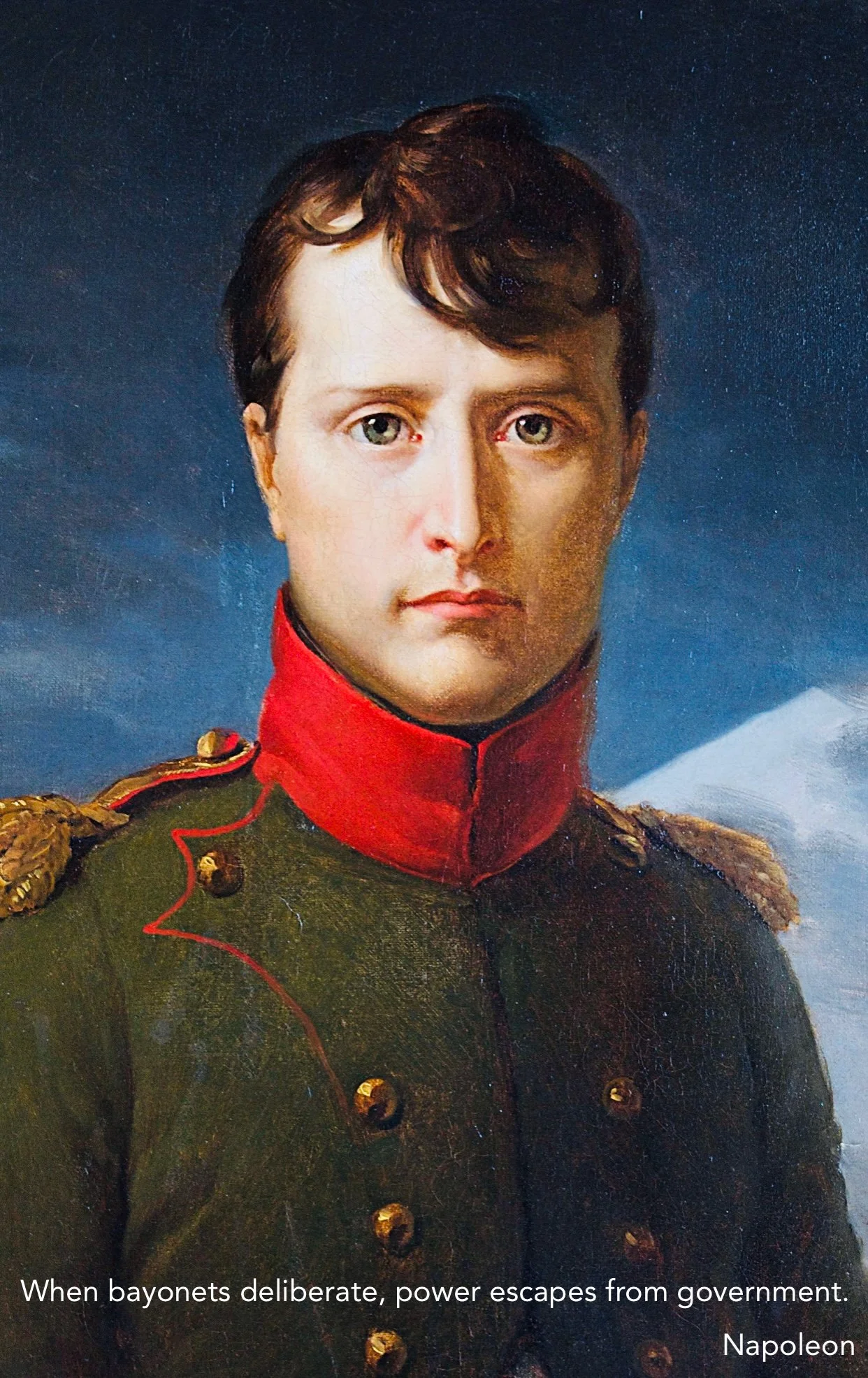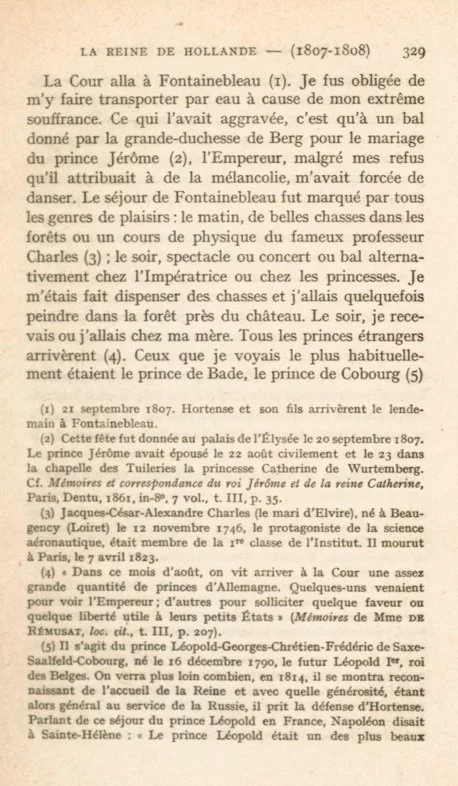Let’s have another look at Hortense’s Memoirs. If you want to read the book it is available for free at the side bar in English and French. Use the widget on the sidebar to translate the text below into pretty much any language.
Napoleon orders Hortense to dance at a ball in his ongoing attempts to cure her depression. Napoleon finally informs Hortense of the near universal belief that they were an adulterous couple. This is the rumor that had been driving Louis - Napoleon’s brother - insane. Hortense was so sheltered, she hadn’t even been aware of this rumor.
The search for the true story behind this rumor is what launched my deep research into Napoleon. I wanted to know why this affair was so widely credited to exist and whether or not it did really exist.
If there had been no affair, then why was it so widely believed?
After all of these years, I have been attempting to show the reason but it is a bit outlandish and difficult to prove but I know beyond a shadow of a doubt that it is true. My knowledge of this comes from a personal revelation.
Napoleon and Hortense were spiritual twins also known as “twin flames”. They couldn’t be together and it made them both extremely unhappy. It also sparks many of the extreme problems that shaped European history. If Napoleon and Hortense could’ve been together, they probably could have better fended off that international spy system faction that plagues our world and our progress as humans.
Hortense’s memoirs continues:
I was obliged to make the trip by water because of my extreme weakness. This had been increased by the fact that at a ball, given by the Grand Duchess of Berg in honor of the marriage of Prince Jerome, the Emperor in spite of my protests, which he blamed on my state of depression, had forced me to dance.
The court's stay at Fontainebleau was enlivened by all sorts of amusements. In the morning there would be elaborate hunting expeditions in the forest or lectures on physics by the famous Professor Charles. In the evening there would be either a play, concert or dance in the apartment of the Empress or in those of the princesses.
I was excused from taking part in the hunting parties and occasionally would go and paint in the forest near the palace. In the evening I held a reception or I went to my mother's apartment. Many foreign princes visited the imperial court.
Those I saw the most frequently were the Prince of Baden, the Prince of Coburg and the Princes of Mecklenburg. One of the last-named interested me particularly because he had just lost his wife, sister of the Emperor of Russia, and was overcome with grief. As I rarely went out and was obliged to remain more and more on my chaise longue everyone was kind enough to come and take tea with me and bring me the latest news of what was going on. My husband wrote rarely. He accused me of not having kept my word because two weeks after his departure from Paris I had not appeared in Holland.
Consequently, he no longer spoke of my return but demanded that his son be sent to him. The child was extremely delicate, and the doctors declared that the Dutch climate would not agree with him. This was a cause of new worries and anxieties for me. To send him to a place where his health would be in danger was a terrible idea.
I explained all my reasons to my husband; I forwarded all the reports of the physicians; but he had made up his mind to have what he wanted and I felt that in the end I should be obliged to give in.
The kingdom of Westphalia had just been created, and Jerome with his wife went to Cassel, the new capital. The Princess of Baden returned to her husband at Mannheim., and the Grand Duchess of Berg and I were left alone in the midst of a still brilliant court. The petty annoyances and vexations of every-day life exist at court as they do elsewhere, and are still more disagreeable there on account of the stately and solemn setting.
The glorious Peace of Tilsit had restored order and general happiness. All hopes seemed to have been realized, all wishes fulfilled.
Nevertheless, those on whom the Emperor had conferred power and wealth were uneasy. They scrutinized the future and were alarmed at the apparent lack of stability of the regime. For the first time the topic of a divorce between the Emperor and his wife was openly discussed.
The Emperor, it is true, had not said a single word in regard to it as yet, a fact which caused the friends of the Empress to consider such remarks as were made to be due merely to the hostility of certain individuals. Having been asked by my husband to present some special petition to his brother I requested and was granted an audience.
It was at a time when the King was sending back from Holland many Frenchmen belonging to his body-guard.
The Emperor was annoyed and displeased with him. He showed this plainly by the way in which he received me. I attempted to soothe him as I usually succeeded in doing.
I begged him to allow Frenchmen to wear the Order of Holland (which Louis had recently created) and thus recognize the existence of this order. The Emperor declared that as far as he was concerned, he would never wear it, for the King had instituted it at a time when he had asked him not to do so.
A few days later he granted one of the ministers, Mollien, permission to wear this decoration. I also spoke about my husband's wish to have his son with him in Holland and the doctors' fears as to the effects of the climate on the child's health, owing to his frail constitution.
This was the Emperor's answer, "A father asks that his son join him. The child is not yet seven years old and I cannot prevent his departure. He is the only boy in the family. If he returns to Holland he will die as his older brother did, and the entire French nation will oblige me to obtain a divorce. People have no confidence in my brothers, who, moreover, are all self-seeking and ambitious. Eugene does not bear my name, and in spite of my efforts to restore peace my reign will be followed by complete anarchy. Only by having a son to succeed me can matters be arranged. If I have not yet secured a divorce the only thing that has restrained me has been my affection for your mother, for all France is anxious to have me do so. This was obvious at the moment of your son's death. Everyone believed that I was his father. You know how absurd such an idea is. Yet it was impossible to prevent all of Europe thinking the child was my son."
He stopped a moment, noticing my surprise, and then went on: "The public did not think the worse of you on that account; you are generally considered to be moral in your conduct, yet everyone thought this was true."
After a pause he continued "It was perhaps just as well to have people think so. I considered his death to have been a great misfortune."
I was so overcome that, as I stood beside the fireplace, I was not able to utter a word. The remark, "It was perhaps just as well that people should think so," seemed to tear a veil from my eyes. It caused a turmoil in my brain and struck deep into my heart, wounding me more than all the rest of the Emperor's words.
Was it possible that while he had been treating me as his daughter, while I had been glad and grateful to look upon him as a father who took the place of the one I had lost, all these attentions, this solicitude was the result of deliberate planning and not of spontaneous affection? The thing that is dearest to a woman, her reputation, had in this instance been sacrificed for reasons of State, instead of being protected by the man who should have been the first to do so.
Those marks of affection which the Emperor had bestowed on me, and which I considered both precious and gratifying, furnished additional proof of my shame in the eyes of the world. The Emperor had been able to conceive the idea that I might be guilty.
His compliments, instead of being, as I had considered them, sincere tokens of his esteem, had doubtless been empty phrases prompted by political motives. Instead of being my friends the people about me were perhaps merely courtiers seeking the favor of the mother of the Emperor's heir.
I had perhaps been simply an instrument by which ambitious persons had hoped to gain their ends. Ah, how dreadful it is to have one's illusions shattered so rudely! Yet I admit this first movement of indignation passed off quickly. Evil that comes from without, and of which we do not cherish the secret sting within our own bosoms, strikes us but is powerless to inflict deep wounds.
My heart was pure, and I knew that truth is not to be found at the courts of monarchs, that where ambition holds the center of the stage one cannot expect to find either sincerity or rectitude. Only I could not help feeling sorry for my lot.
Since then I have thought over this conversation with the Emperor and, having grown more familiar with his character, I have come to believe that the words I treated so seriously were uttered merely as a passing phrase.
I am convinced that he never could have credited a gossip which cast an unpleasant light on my character. He had enough enemies who sought to slander him in every way without himself offering them additional material. The verses printed in reply to an English newspaper attack which I had asked Bourrienne to explain to me shortly after my marriage were proof enough that he did not wish any discreditable reports about my conduct to be put in circulation.
At the moment, however, I did not reason so clearly, and for a long time I felt a repulsion toward the Emperor on account of what he had said. His mention of a divorce had also struck me, and I was therefore less astonished than I should otherwise have been when later my mother told me of an interview she had had with the Chief of Police, Fouché.
The original French is available below:

















